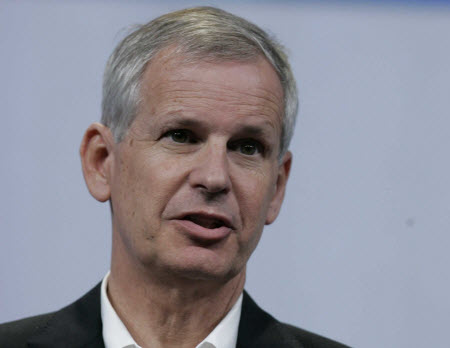No Breaks for Ergen as Dish Falls
The smarter way to stay on top of the multichannel video marketplace. Sign up below.
You are now subscribed
Your newsletter sign-up was successful

Dish Network stock, down more than 20% after speculation it could be a prime takeover target has waned, could be in for sharper declines as analysts estimate that even its biggest asset — its wireless spectrum — isn’t as valuable as once thought.
Dish stock has fallen about 21% since mid-July, when talk was it could be a target of companies such as Verizon Communications, which saw value in Dish’s 13.3 million satellite subscribers, its Sling TV over-the-top platform and its wireless licenses. Up to that point, and despite sharp declines in its subscriber base — it lost 196,000 pay TV customers in the second quarter — Dish stock had been a strong performer.
For its part, Verizon had repeatedly denied it was on the hunt for Dish. And after Verizon chairman and CEO Lowell McAdam insisted at an industry conference that the telco had “moved on” and isn’t interested in any M&A at all for now, and Dish chairman and CEO Charlie Ergen hinted on a second-quarter conference call that he may have to build out his own wireless network, the stock has plunged.
Related > Ergen: More M&A Is Coming
The End of a Roll
For 10 of the past 12 months, Dish stock had been on a roll, up 21.4% from its Sept. 27, 2016, price of $54.35 per share to $66 each on July 14. But the stock couldn’t hold that momentum: It dipped to $52.15 on Sept. 26, down 21% from its July high. And according to some analysts, that could just be the beginning.
In a note to clients last week MoffettNathanson principal and senior analyst Craig Moffett noted that Dish has underperformed the market by about 54% since 2015, the year the federal AWS-3 wireless spectrum auction results were released.
“Despite this sharp underperformance, however, we believe the shares have much further to fall,” Moffett wrote. The analyst also lowered his 12-month price target on the stock to $37 per share from $45.
It’s unclear where the stock will end up shortterm; Ergen has frequently been on the winning side of long-odds bets in the business of television, and the current stock drop could be a momentary stall.
Still, Moffett doesn’t see any daylight in Dish’s core satellite-TV business — he estimates it has lost about 1 million satellite-TV subscribers since 2016 — and its Sling TV business is beginning to slow. While Dish doesn’t release Sling TV subscriber figures, Moffett estimates the OTT pioneer added about 89,000 customers in the second quarter, down from 177,000 additions in the first quarter but ahead of the 49,000 additions in Q2 2016. Moffett estimates that additions will further decelerate from about 214,000 in 2017 to just 65,000 by 2021.
He’s not alone. In an August research note after Dish’s second-quarter results, Telsey Advisory Group media analyst Tom Eagan wrote that “Dish’s business model is proving increasingly unsustainable.”
In an email message, Eagan said Dish has options, including trying to block a merger of wireless carriers Sprint and T-Mobile to extract spectrum concessions, which it could then use to negotiate favorable terms with Amazon for its IoT service.
“Or, neither of these strategies could work out favorably relative to Dish’s current valuation,” he said.
Adding further pressure are aggressive promotions from its top OTT and satellite competitor, AT&T. According to Moffett, AT&T is offering its 60-channel DirecTV Now service to its unlimited wireless plan customers for just $10 per month (normally priced at $35). Unlimited wireless customers can get DirecTV’s 145-channel Select package, normally priced at $90 per month, for just $25 per month for two years. Dish’s lowest priced satellite-TV package is priced at $49.99 per month.
Spectrum Unlikely to Pay Off
But the biggest drop could be in spectrum value. For years, analysts have said that despite the maturation of the pay TV industry, Dish was poised to come out ahead because it had invested wisely and cheaply in buying wireless spectrum. The belief was that even if Dish never built out its own wireless network, it could sell the spectrum at a ridiculously high profit. At one point a little more than a year ago, Dish’s spectrum was estimated to be worth as much as $40 billion.
That estimate has dropped considerably in the past several months. After Dish reported its Q2 results in August, Eagan estimated the spectrum was worth about $26 billion. Last week, Moffett valued it at $24 billion.
The decline in value has occurred even as wireless usage has grown exponentially and pay TV providers are increasingly looking at wireless as the future of content delivery. And as wireless providers gear up for the next generation of the technology — 5G — there appears to be greater need for fiber connections between cells than for more bandwidth.
In his note, Moffett argued that even the lower spectrum valuation may be too high, adding that an asset is only worth what others might pay for it, and there do not seem to be any buyers. Verizon has said it isn’t interested in more spectrum — it sat out the most recent federal spectrum auctions earlier this year — and AT&T is tied up trying to gain approval for its $107.8 billion purchase of Time Warner Inc. Given Sprint and T-Mobile’s reported merger talks, a spectrum buy for either carrier is out of the question, at least in the short term.
Meanwhile, federal regulations require Dish to build out its spectrum to 70% of the country by 2020 or risk losing the licenses. That, according to Moffett, is the company’s more pressing issue.
The smarter way to stay on top of the multichannel video marketplace. Sign up below.
